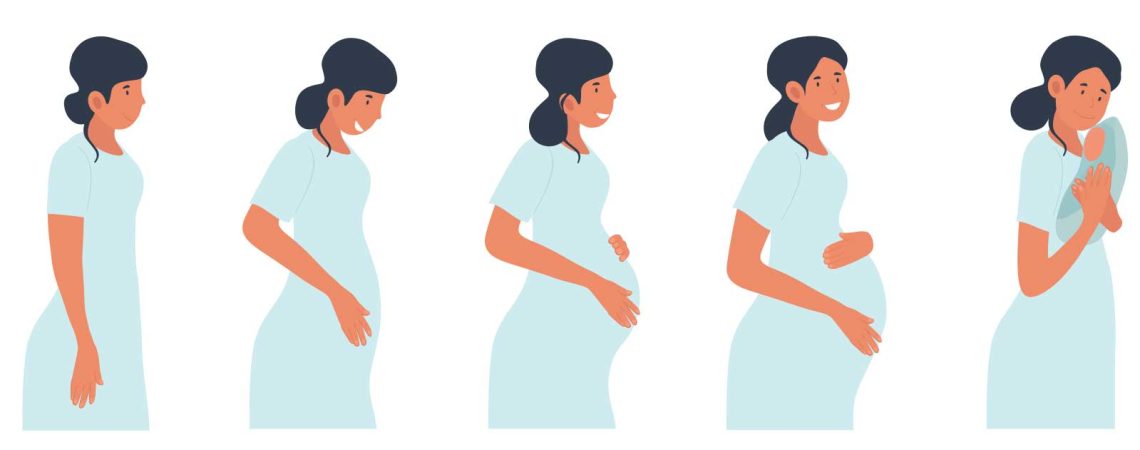Introduction
Weight gain during pregnancy is a natural and necessary part of supporting a growing baby and preparing the mother’s body for childbirth and breastfeeding. However, understanding how much weight to gain—and when—is important for the health of both mother and baby. Gaining too little can increase risks such as low birth weight and premature delivery, while gaining too much may lead to gestational diabetes, high blood pressure, and complications during delivery. This article provides evidence-based guidelines on healthy weight gain during pregnancy, broken down by body mass index (BMI), trimester, and offers practical tips on managing weight gain safely.
Guidelines by BMI
The amount of weight recommended during pregnancy varies based on a woman’s pre-pregnancy BMI. The Institute of Medicine (IOM) provides the following general guidelines:
- Underweight (BMI less than 18.5): Recommended weight gain is about 28 to 40 pounds (13 to 18 kg).
- Normal weight (BMI 18.5–24.9): Recommended weight gain is about 25 to 35 pounds (11 to 16 kg).
- Overweight (BMI 25–29.9): Recommended weight gain is about 15 to 25 pounds (7 to 11 kg).
- Obese (BMI 30 or higher): Recommended weight gain is about 11 to 20 pounds (5 to 9 kg).
These ranges help optimize fetal growth while minimizing health risks for the mother. Women with higher BMI are advised to gain less to reduce complications, whereas underweight women may need to gain more to support healthy fetal development.
Weight Gain by Trimester
Weight gain is not linear throughout pregnancy; it typically follows this pattern:
- First Trimester (Weeks 1–13): Weight gain is usually modest, about 1 to 5 pounds (0.5 to 2.3 kg). Some women may even lose weight early on due to nausea or vomiting.
- Second Trimester (Weeks 14–26): Weight gain picks up to about 1 to 2 pounds per week as the baby grows rapidly.
- Third Trimester (Weeks 27–40): Steady weight gain continues at a similar rate of 1 to 2 pounds per week.
By the end of pregnancy, most women gain about 25 to 35 pounds, but this varies depending on individual factors and BMI.
Managing Healthy Weight Gain
Maintaining a healthy weight gain during pregnancy involves a balanced approach to diet and physical activity:
- Nutrition: Focus on nutrient-dense foods rich in protein, whole grains, fruits, vegetables, and healthy fats. Avoid empty calories from sugary snacks and processed foods.
- Portion control: Eating for two means increased nutrition, not doubling calorie intake. Most women need only about 300 extra calories per day during the second and third trimesters.
- Exercise: Moderate physical activity, such as walking, swimming, or prenatal yoga, can help manage weight gain and improve mood and energy levels. Consult your healthcare provider before starting any exercise routine.
- Regular check-ups: Routine prenatal visits include weight monitoring to ensure healthy progression and early detection of any concerns.
- Avoid restrictive diets: Cutting calories excessively can harm fetal growth. Instead, aim for steady, gradual weight gain as advised by your provider.
Conclusion
Understanding how much weight to gain during pregnancy is essential for the health of both mother and baby. Weight gain recommendations vary according to pre-pregnancy BMI and follow a typical pattern across trimesters. By focusing on balanced nutrition, sensible portion sizes, and appropriate physical activity, expectant mothers can manage their weight gain effectively. Regular medical guidance ensures personalized care and helps avoid complications associated with inadequate or excessive weight gain. Prioritizing a healthy pregnancy weight supports optimal fetal development and lays the foundation for long-term health.
FAQs:
How much weight is healthy?
Healthy weight gain depends on your BMI but generally ranges from 11 to 40 pounds.
Does it vary by trimester?
Yes, weight gain is slow in the first trimester and faster in the second and third.
What if I gain too much?
Excessive gain can increase risks of gestational diabetes, high blood pressure, and delivery complications.
Can being underweight harm the baby?
Yes, it can lead to low birth weight and preterm birth.
How do I track my weight gain?
Regular prenatal visits include weight checks to monitor healthy progress.






